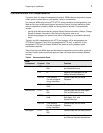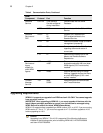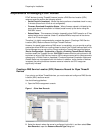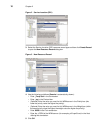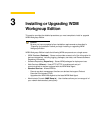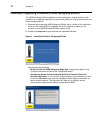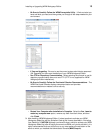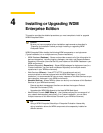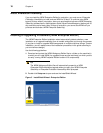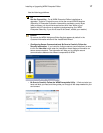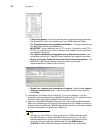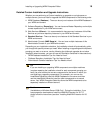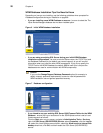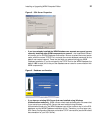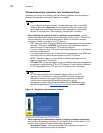
4 Installing or Upgrading WDM
Enterprise Edition
This section provides the detailed procedures you must complete to install or upgrade
WDM Enterprise Edition.
Caution
Be sure you have completed all pre-installation requirements as described in
"Preparing for Installation" before you begin installing or upgrading WDM
Enterprise Edition.
WDM Enterprise Edition installs the following WDM components on a single server
(Typical installation) or on multiple servers (Custom installation):
• WDM Database (Database) - Stores and provides access to all of the information for
device management, including logging, packages, user data, and Remote Software
Repository information (there can be only one instance of this WDM Database in your
WDM environment).
• Software Repository (Repository) - Stores WDM packages for deployment use (in a
Custom installation, you can have one Master Repository and multiple remote
repositories in your WDM environment).
• Web Services (HServer) - Uses HTTP/HTTPS to enable push and pull
communications to devices equipped with the WDM Web Agent (in a Custom
installation, it is recommended to have as many instances of this Web Services as you
have repository instances in your WDM environment).
• Standard Services - Allows WDM to (there can be only one instance of this Standard
Services in your WDM environment):
· Execute pre-boot management functions on devices that support Preboot
Execution Environment (PXE).
· Upgrade older WDM Web Agents to the latest WDM Web Agent.
• Administrator Console (MMC Snap-in) - User interface allows you to manage all of
your network devices easily and quickly (in a Custom installation, you can have
multiple instances of this Administrator Console in your WDM environment).
Tip
Using a WDM Enterprise Sales Key or Enterprise Evaluation License Key
during installation allows the WDM components to be separately installed on
different servers.



